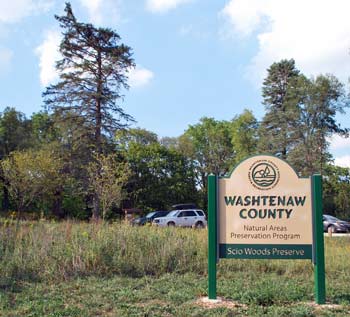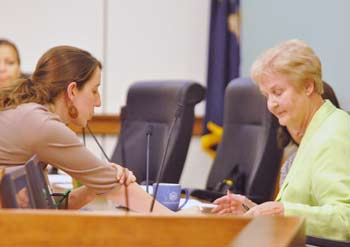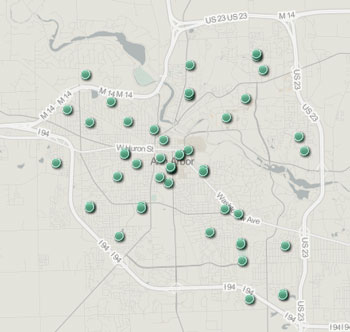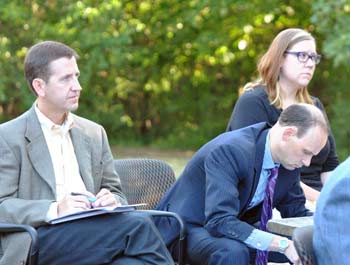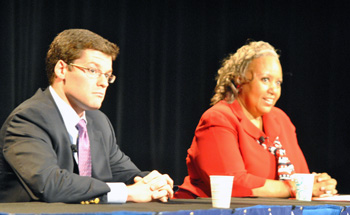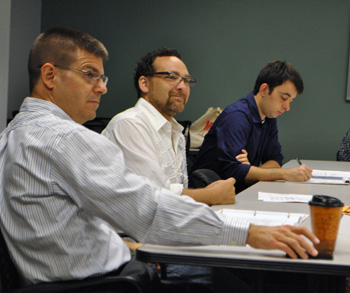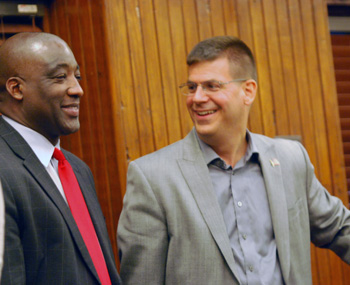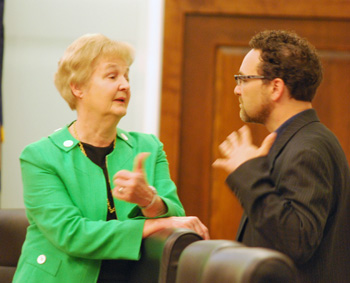Washtenaw County board of commissioners meeting (July 11, 2012): Two agenda items dominated the discussion at the recent county board meeting: (1) an interim plan for the Washtenaw Head Start, reducing staff as the county prepares to hand over the program to a new entity, and (2) documents related to a proposed countywide transit authority.
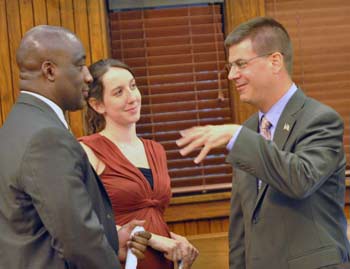
From left: Michael Ford, CEO of the Ann Arbor Transportation Authority; Sarah Pressprich Gryniewicz, AATA’s community outreach coordinator; and Washtenaw County commissioner Dan Smith. Smith proposed several amendments to the four-party agreement and articles of incorporation, which form the foundation for a new county public transit authority. All of the amendments were defeated. (Photos by the writer.)
After a 2.5-hour debate, county commissioners on a 7-4 vote gave initial approval to a four-party agreement and articles of incorporation that lay the foundation for a broader public transit authority in this area – tentatively called the Washtenaw Ride Transportation Authority. Voting against the agreement and articles of incorporation were Alicia Ping, Wes Prater, Dan Smith and Rob Turner. The board also set an Aug. 1 public hearing to gather feedback on the agreement. A final vote is expected to take place at that Aug. 1 meeting.
The other parties in the agreement include the cities of Ann Arbor and Ypsilanti, which both would contribute existing millages to the new authority. The fourth party to the agreement is the Ann Arbor Transportation Authority, which is spearheading this effort and would shift about $200 million in assets to the new entity. The governing bodies of those three parties have already approved the transit documents. [.pdf of four-party agreement and articles of incorporation]
The board debated several amendments put forward by Dan Smith, but none of the amendments secured enough votes to pass. One of the main arguments against making any changes came repeatedly from Leah Gunn, who noted that amendments made by the county board would require that the other three parties reconsider the documents. She called it a “foolish waste of time.”
Smith argued that this was the first time that formal, representative input has been heard from communities outside of Ann Arbor and Ypsilanti. The amendments were intended to make the new transit authority more attractive to smaller municipalities, who’ll have the option of opting out. Smith raised concerns that the current governance structure doesn’t provide the best possible representation for taxpayers.
Another issue drawing heated discussion related to Head Start, which provides pre-school services to 561 local children, ages 3-5, and their families. Last year, the board voted to relinquish its 46-year administration of the program on July 31, 2012. But the transition to a new administrator – a process overseen by the federal Head Start program – hasn’t moved as quickly as expected. So the county agreed to a one-year extension to continue administering the program, through July 31, 2013.
On July 11, the county board was asked to approve changes to the program from Aug. 1, 2012 through July 31, 2013 – as part of authorizing a federal grant application for the program. Ronnie Peterson cast the sole vote against the changes, and objected strenuously to any program cuts. He voiced his concerns at length, and asked – as he has in the past – that independent experts be brought in to discuss how the changes will impact the children. He also vowed to try to keep Head Start under the county’s administration, rather than relinquishing control. The issue will be addressed at an Aug. 2 working session, but it’s unlikely that the board will reverse its decision to cut ties with Head Start.
Other commissioners objected to Peterson’s contention that they didn’t care about poor children. Rob Turner urged board chair Conan Smith to form a coalition of local educators and government leaders to tackle the problem of educational disparities within the county.
Separately, the board passed a resolution supporting the selection of the Washtenaw Intermediate School District as the next local Head Start administrator. The selection will be made by federal Head Start officials.
In other action, commissioners heard public commentary and gave initial approval to exempt bed & breakfasts and cottages from Washtenaw County’s 5% accommodations tax. In a separate vote, the board set a public hearing for Aug. 1 to seek input on the proposed ordinance change. A final vote on the resolution is expected at the board’s Aug. 1 meeting.
That Aug. 1 meeting will also include a public hearing and vote on a brownfield financing plan for a residential development at 618 S. Main St. in Ann Arbor. The apartment complex is located at the site of the former Fox Tent and Awning, north of Mosley between Main and Ashley, and is being put forward by Dan Ketelaar’s Urban Group Development Co.
In another development-related matter, the board authorized a contract with Sylvan Township related to debt repayment on bonds issued 11 years ago for a water and wastewater treatment plant. It’s another attempt to establish an arrangement under which Sylvan Township will repay the county for covering bond payments – contingent on Sylvan Township voters approving a 20-year, 4.4 mill tax that’s on the Aug. 7 ballot. [Full Story]
